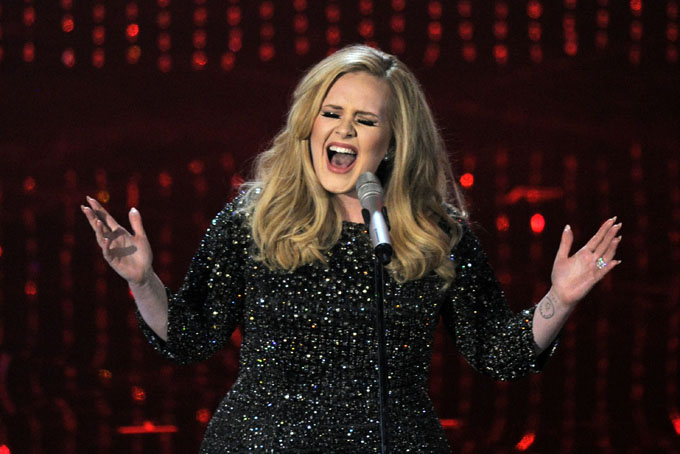
This Feb. 24, 2013 file photo shows singer Adele performing “Skyfall” during the Oscars at the Dolby Theatre in Los Angeles. (Photo by Chris Pizzello/Invision/AP, file)
by Ryan Nakashima
LOS ANGELES (AP) — There are about 600 versions of Adele’s Oscar-winning song “Skyfall” on the Spotify subscription music service. Not one of them features Adele.
Adele’s label, XL Recordings, keeps her music off of all-you-can-listen subscription plans until download sales peter out. In the meantime, copycat artists fill the void, racking up royalty revenue, often before customers realize they’ve been listening to someone else.
Alice Bonde Nissen found that out the hard way. She once paid 99 Krone ($17) a month for Spotify’s premium service in Denmark. Bonde found a version of “Skyfall” and mistakenly clicked on a “follow” button to become a fan of GMPresents and Jocelyn Scofield, the name for a cover-song specialist with some 4,600 Spotify followers. Scofield, who didn’t respond to a message seeking comment for this story, has the most listened-to cover of “Skyfall” on the service.
“When I found out … that I couldn’t find the original ‘Skyfall’ (and some other hits) I decided to quit Spotify,” Nissen says.
Thousands of cover songs crowd digital music services such as Spotify and Rhapsody and listeners are getting annoyed. The phenomenon threatens the growth of these services —which have millions of paying subscribers— and could hold back the tepid recovery of a music industry still reeling from the decline of the CD.
Streaming services put a world of music at listeners’ fingertips with millions of tracks, everything from the latest pop hits to age-old violin concertos. For a flat fee — usually about $10 a month in the U.S. — users can listen to as many songs as they wish. The music resides on the provider’s servers and gets transmitted, or streamed, to subscribers as they listen on smartphones, tablet computers and PCs.
The services allow users to store songs on their devices as long as they keep paying. But because such a vast selection can be stored online in the so-called cloud, when listeners search for popular songs, they often find oddball renditions.
Cover songs are perfectly legal in the U.S. and have a long tradition in the music industry. Some covers are even more famous than the originals. Which do you think of first, Aretha Franklin’s soaring 1967 version of “Respect,” or Otis Redding’s original from two years earlier? How about Jimi Hendrix’s funky 1968 rendition of “All Along the Watchtower”? Does anyone even remember that Bob Dylan wrote and sang it in a release six months before?
The difference today is that anyone with a computer, a microphone and an Internet connection can create and distribute a cover. New technology, from affordable digital recording equipment and sound-mixing programs to convenient online services are making homemade covers an easy and profitable endeavor. And sing-it-yourself shows such as “American Idol,” ”The Voice” and “The X Factor” are fueling the notion that anyone with a decent voice can be a star.